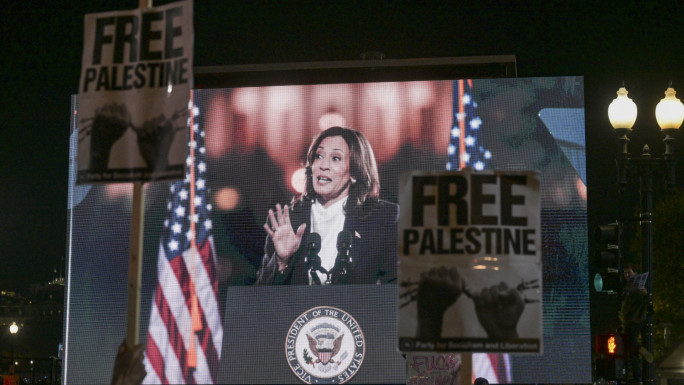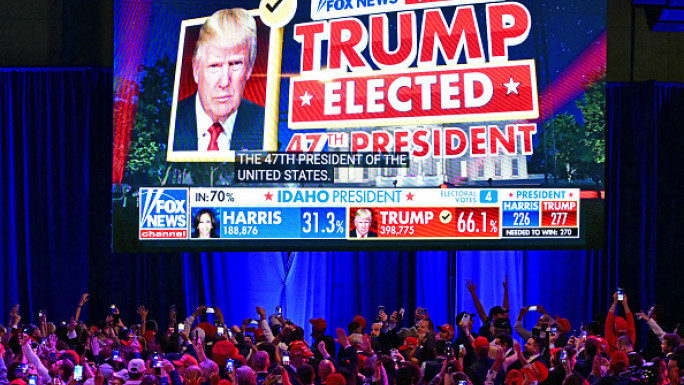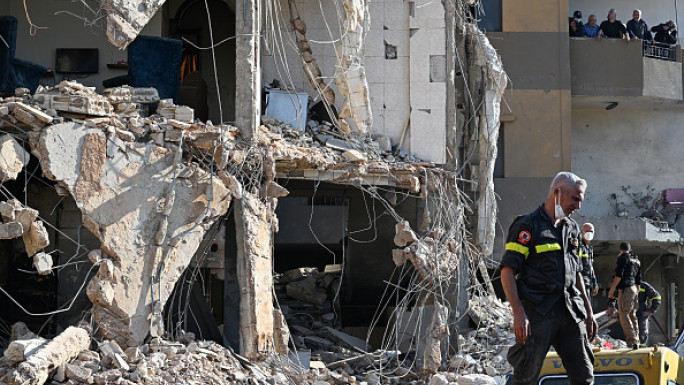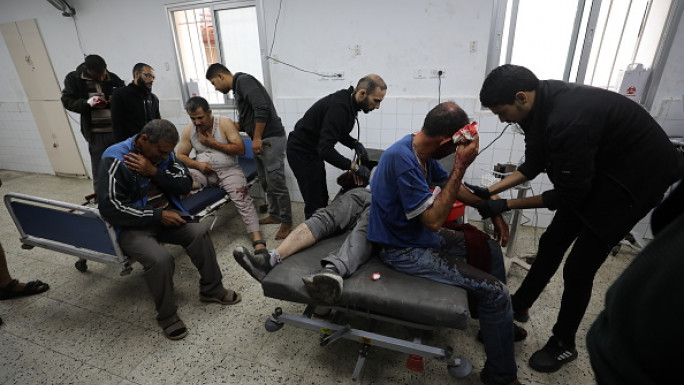
Morocco's election ignores foreign policy
Morocco's election ignores foreign policy
Comment: The current political elite in Morocco is not capable of working hand in hand with the King in proposing foreign policy and helping steer the country, writes Samir Bennis.
6 min read
Friday's parliamentary election is the second since the new constitution was introduced in 2011 [Getty]
Morocco will hold elections for Parliament this coming Friday October 7, only the second of their kind since the adoption of Morocco's new constitution in 2011.
The new constitution established a new phase of democratisation and rule of law in Morocco. It has also afforded political parties room for manoeuver to play an important role in the country's economic, political and social development, both from within the government or from the opposition.
The new constitution established a new phase of democratisation and rule of law in Morocco. It has also afforded political parties room for manoeuver to play an important role in the country's economic, political and social development, both from within the government or from the opposition.
From the outside, this election occurs as the world is facing many challenges. It is imperative that Morocco immunises itself from the inside, in mobilising the forces at its disposal to face these challenges.
Morocco's parliamentary election comes in a year when many countries with which Morocco's has strong relationships will hold decisive elections, such as the United States and France. Spain as well, is expected to hold legislative elections for the third time in less than a year, in the event that its political parties fail to form a new government.
Morocco's parliamentary election comes in a year when many countries with which Morocco's has strong relationships will hold decisive elections, such as the United States and France. Spain as well, is expected to hold legislative elections for the third time in less than a year, in the event that its political parties fail to form a new government.
The question that observers are asking is whether Moroccan political parties have any plans or vision to complement the groundwork carried out by Morocco's diplomacy, and help in defending the fundamental issues of Morocco's foreign policy agenda, especially in the Sahara.
What plans have Morocco's political parties devised to deal with the Spanish radical party, Podemos, known for its hostility towards Morocco and its sympathy with the Polisario Front?
What strategy will the parties adopt to defend Morocco's interests, in the event Podemos participates in the upcoming Spanish government? One might ask, what is their strategy in the event Donald Trump wins the US Presidential election?
And what is their vision for establishing channels of communication with the representatives of the two major US parties to make them aware of the leading role Morocco plays in the fight against terrorism? How will they communicate Morocco's position on the Sahara and the arguments that underpin it?
 |
This total absence of real programmes to promote influential parliamentary players in Morocco's foreign policy is nothing new |  |
And what is their vision for establishing channels of communication with the representatives of the two major US parties to make them aware of the leading role Morocco plays in the fight against terrorism? How will they communicate Morocco's position on the Sahara and the arguments that underpin it?
A lack of vision for parliamentary diplomacy
Moroccan parties spend a great deal of time and energy on weakening one another through the exploitation of scandals. This, it seems, leaves no room for them to develop genuine and well-thought-out strategies on how they intend to improve on Morocco's diplomacy, and build on it over the next five years.
This total absence of real programmes to promote influential parliamentary players in Morocco's foreign policy is nothing new. It is in line with the empty chair policy that has been adopted over the past decade, and the failure to play any active role in defending Morocco's foreign policy interests.
This total absence of real programmes to promote influential parliamentary players in Morocco's foreign policy is nothing new. It is in line with the empty chair policy that has been adopted over the past decade, and the failure to play any active role in defending Morocco's foreign policy interests.
The absence of parliamentary or partisan diplomacy in defending the Moroccan position, or in raising awareness about the Moroccan autonomy plan as a political solution to this conflict in the Western Sahara, is particularly striking.
The latest example reflecting this absence and the failure of Morocco's political parties to play a role, is the decision of the Chilean parliament in May to urge the country's President to recognise the Sahrawi Arab Democratic Republic (SADR) and defend the Sahrawi's right to self-determination.
 |
Morocco needs political leaders whose concerns go beyond making visits for the sake of show |  |
This adds to the likelihood that Ecuador may restore its recognition of the SADR. During a visit of Ecuador's Foreign Minister, Guillaume Long, to Algeria on September 29, he hinted at the existence of "relations of fraternity" between Ecuador and the "Sahrawi people."
This statement may signal Ecuador's intention to reconsider its decision to suspend its recognition of the so-called SADR and bring its relations with the Polsario back to where they were before June 2014. The same trend has been developing in other major Latin American countries in recent years.
In September 2014, Brazil's House of Representatives called on the then-Brazilian President Dilma Rousseff to take a "clear stance" on the Western Sahara and to recognise the SADR. It is likely that the Brazilian parliament will keep putting pressure on the government to take this step. While this serious and worrying development is taking place, Moroccan political parties appear to be off the radar.
This statement may signal Ecuador's intention to reconsider its decision to suspend its recognition of the so-called SADR and bring its relations with the Polsario back to where they were before June 2014. The same trend has been developing in other major Latin American countries in recent years.
In September 2014, Brazil's House of Representatives called on the then-Brazilian President Dilma Rousseff to take a "clear stance" on the Western Sahara and to recognise the SADR. It is likely that the Brazilian parliament will keep putting pressure on the government to take this step. While this serious and worrying development is taking place, Moroccan political parties appear to be off the radar.
Going beyond the King's initiatives
Some might argue that foreign policy is the heart of the King's prerogatives, for he sets the course of Morocco's foreign policy. They may say that political parties do not have room to manoeuver or to play a prominent a role in defending Morocco's most pressing foreign policy issues.
However, while foreign policy is the prerogative of the King in his capacity as head of state, political parties can take the initiative, provide advice and serve an important role in parallel diplomatic relations. They are not simply reduced to the role of the spectator, waiting for and praising the King's initiatives.
However, while foreign policy is the prerogative of the King in his capacity as head of state, political parties can take the initiative, provide advice and serve an important role in parallel diplomatic relations. They are not simply reduced to the role of the spectator, waiting for and praising the King's initiatives.
 |
Moroccans need to wait for the emergence of a new political elite |  |
Providing advice and taking initiative were exactly the roles that Moroccan political parties played after Morocco's independence, until the beginning of the 21st century.
Political leaders such as Allal Fassi, Mohammed Boucetta, Abderrahim Bouabid and Abderrahman Youssoufi left an indelible mark on Morocco's collective memory with their initiatives to preserve the country's territorial integrity and their calls on the government to adopt positions that serve Morocco's foreign policy interests.
Following Morocco's independence in 1956, it was at the insistence of Morocco's political parties, such as Istiqlal and the Socialist Union of Popular Forces (USFP), that both the late King Mohammed V and King Hassan II adopted an aggressive foreign policy from the late 1950s to the 1970s. This policy aimed to end the Spanish occupation of Moroccan territories, such Tarfaya, Sidi Ifni and the Western Sahara.
Political leaders such as Allal Fassi, Mohammed Boucetta, Abderrahim Bouabid and Abderrahman Youssoufi left an indelible mark on Morocco's collective memory with their initiatives to preserve the country's territorial integrity and their calls on the government to adopt positions that serve Morocco's foreign policy interests.
Following Morocco's independence in 1956, it was at the insistence of Morocco's political parties, such as Istiqlal and the Socialist Union of Popular Forces (USFP), that both the late King Mohammed V and King Hassan II adopted an aggressive foreign policy from the late 1950s to the 1970s. This policy aimed to end the Spanish occupation of Moroccan territories, such Tarfaya, Sidi Ifni and the Western Sahara.
Moroccan political leaders should be inspired by the tremendous work carried out in 2000 when Morocco succeeded in convincing India to withdraw its recognition of the SADR. This outcome was achieved thanks to the leadership role played by former Prime Minister Abderrahman Youssoufi.
What Morocco needs now more than ever, is political leaders whose concerns go beyond making visits for the sake of show, and promoting themselves in the media to give the impression that they are playing the role of partisan diplomacy.
Morocco needs the presence of clear-sighted political leaders who are keen to fully play their role in defending Morocco's foreign policy interests, rather than leaders whose main concern is to keep their comfortable positions to the detriment of the aspirations of the Moroccan people.
Morocco needs the presence of clear-sighted political leaders who are keen to fully play their role in defending Morocco's foreign policy interests, rather than leaders whose main concern is to keep their comfortable positions to the detriment of the aspirations of the Moroccan people.
A sober analysis of Morocco's politics and its leaders clearly shows that Morocco does not have a political elite that is capable of working hand in hand with the King, or proposing foreign policy that can help the country prepare its course of action for the next five or ten years.
Moroccans need to wait for the emergence of a new political elite and hope that it will have the leadership skills and charisma that will enable its representatives to fully participate in devising Morocco's foreign policy.
Moroccans need to wait for the emergence of a new political elite and hope that it will have the leadership skills and charisma that will enable its representatives to fully participate in devising Morocco's foreign policy.
Samir Bennis is a political analyst. He received a PhD in international relations from the University of Provence in France and his research areas include relations between Morocco and Spain and between the Muslim world and the West, as well as the global politics of oil.
He has published more than 150 articles in Arabic, French, English and Spanish, and authored Les Relations Politiques, Economiques et Culturelles Entre le Maroc et l’Espagne: 1956-2005, which was published in French in 2008. He is the co-founder of Morocco World News and lives in New York. Follow him on Twitter: @SamirBennis
Opinions expressed in this article remain those of the author and do not necessarily represent those of The New Arab, its editorial board or staff.





 Follow the Middle East's top stories in English at The New Arab on Google News
Follow the Middle East's top stories in English at The New Arab on Google News


